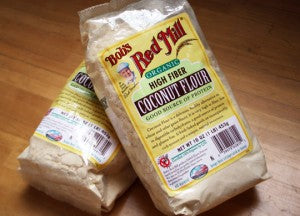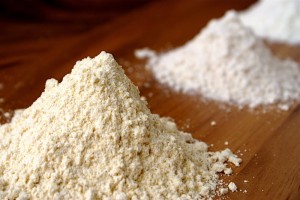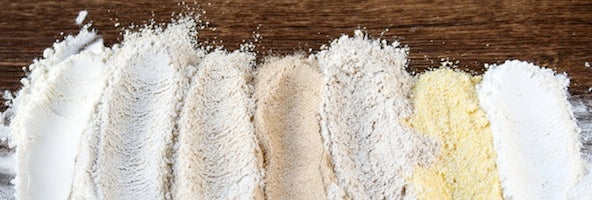Wheat flour is one of the greatest problems in today’s diets as not only does it cause a high surge of blood insulin levels, but it also increases the level of inflammation occurring in your body. This can then go on to lead to a wide variety of different diseases and conditions, really putting your health at risk.
Furthermore, if you’re someone who doesn’t tolerate gluten well, then you’ll have no choice but to exclude this flour variety from your diet plan.
Fortunately, there are a number of great alternatives that you can serve up that will help you remove or at the very least, reduce this ingredient from your diet.
Let’s go over some of the top substitutes to consider.
Coconut Flour
 The very first flour substitute that could easily be classified as the most effective is coconut flour. This flour variety is very high in dietary fiber, with almost all the carbohydrates found in it coming from dietary fiber.
The very first flour substitute that could easily be classified as the most effective is coconut flour. This flour variety is very high in dietary fiber, with almost all the carbohydrates found in it coming from dietary fiber.
This means that you’ll actually net very few carbohydrates overall and it will have very little influence on your blood glucose levels.
It’s also moderate in fat content and the fat found in it is the MCT variety, which offers numerous health benefits. Finally, it offers a mild coconut flavor, which most people definitely enjoy.
One thing to note about this flour is that it does tend to soak up liquid quite readily, so you may need to increase the total amount of wet ingredients if you’re going to be baking with it.
Almond Flour
The next flour variety that you’ll want to consider is almond flour. Almond flour, as the name suggests, comes from almonds, so is going to be a much lower carb variety of flour with a high healthy fat content.
Almond flour can easily be used in cookies and bars, so makes a great substitute in those types of dishes. It’s also very rich in vitamin E, so helps to provide antioxidant benefits to the body while also improving your skin’s health.
With a relatively mild flavor as well, it’s a nice addition to any of your recipes.
Brown Rice Flour
For those who are gluten free and react well to rice as a grain, brown rice flour is also another option. It’s going to have a relatively high dietary fiber content to it and will also offer a nice nutty taste that enhances the recipes you use it in.
This flour doesn’t last as long sitting in your kitchen however, so aim to purchase it fresh whenever possible.
Oat Flour
Oat flour, which you can easily make yourself by simply grinding up regular oats if you wish, is another perfect addition to your diet plan. Oatmeal is a very complex carbohydrate source and will break down very slowly in the body, ensuring you get a steady stream of nutrient release over time.
another perfect addition to your diet plan. Oatmeal is a very complex carbohydrate source and will break down very slowly in the body, ensuring you get a steady stream of nutrient release over time.
Oat flour, depending on the types of oats you use, may contain gluten, so just keep that in mind. If you are aiming to be gluten free, it may be one to side step unless you know for sure it’s been made from gluten-free oats.
This flour is another one that will go rancid rather quickly, so don’t store it for longer periods of time. If you can purchase it fresh, you’ll be far better off.
If you wish to keep more on hand, this is one flour that you can store in the fridge or freezer as well, so that is always an additional potion.
Quinoa Flour
Quinoa is another great grain to be adding to your diet if you’re aiming to be gluten free and offers a strong nutritional profile being rich in protein as well as dietary fiber.
So, what better way to enjoy it than ground up into a flour? Quinoa flour is a good option for anyone who struggles to get sufficient protein in their diet, so especially great for vegetarians.
It’ll work well in most recipes, however you may want to use half quinoa and half coconut or almond flour to sustain the proper consistency of the recipe dish.
Putting it All Together
So there you have the top flour sources and varieties that you should be considering adding to your diet plan. There are plenty of different options, so you should never feel as though you have to eliminate all your baking if you want to eliminate wheat.
We recommend testing a number of different flour alternatives in individual recipes until you find the flour that you like best.
Have you tried any of these wheat flour alternatives? Please post a comment below and let us know!

